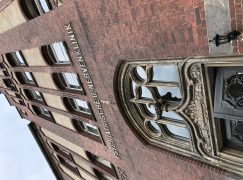When your audience is on lock-down
mainFrom our quartet diarist, Anthea Kreston:
Neck-deep in rehearsals, my string quartet is enroute to Schwarzenberg, a Shangri-la town nestled in a hidden valley in Austria, filled with historic, half-timbered buildings and home to the famed Schwarzenberg Schubertiade, a months long, yearly festival with multiple events every day, drawing a loyal audience who makes there way here along hours of twisting mountain roads, and stays for days, weeks, to bath in the sounds, smells, and tastes of this protected hamlet.
In addition to our quartet schedule, I am guesting with the Musethica Festival, with daily rehearsals, performances in prisons, schools for differently-abled children, psychiatric hospitals, prisons, retirement homes, bars, and final, formal concerts at the Hanns Eisler Hochschule in Berlin.
Conceived as a Marlboro-style learning experience (each group has two embedded, older professionals with younger musicians) combined with a teaching-outreach element (this week will have more than 30 concerts performed), this has given me a chance to get back to a more “American” style of reaching out to the community. My Brahms Op. 36 has in it, as my “professional” counterpart, the eloquent and deeply musical cellist of the Voglar Quartet, Stephan Forck. In addition, the lower half of the brilliant young French quartet Hanson, and rounding it out, an Austrian violinist and Polish violist. Fascinating stories of an East German quartet from the 1980’s are sprinkled in our rehearsals, and the merits of pure/melodic, vertical/horizontal intonation are fodder for lively lunch and dinner conversations – each meal in a different ethnic restaurant with family-style plates passed around our large, long tables. My other group is the Mendelssohn Octet, with the entire Hanson, another French cellist and the director of the festival, the ebullient and energized violist Avri Levitan. His festival is a roaming one – thus far it has occurred in 8 countries, with hundreds of concerts and educational activities. He is a hands-on director- at every meal (often with his 11 month old baby), organising, managing his staff, and rehearsing 6-8 hours a day (there are 4 more works and many more musicians besides the ones in my two groups).
Yesterday we played two concerts for an all-ages school for differently-abled children. I was heartened by the healthy ratio of teacher/aid to student, and to see the obvious love that the adult helpers felt for their young charges. Next we went to a Psychiatric Clinic, Charité. Walking into the ward, I had a distinctly “Cuckoo’s Nest” feel – the orderlies swabbing the deck, the muted greys of the walls, the peek into a patients room (two cots, two dressers, two lamps), the peeling paint and scrub-wearing aids pushing squeaking carts down endless hallways. The smell of institutional food mixed with strong cleaning products lead us to our performance room – the game tables pushed to the side to allow space for the 20 or so patients (and a hefty, tattooed bouncer-type of staff member). The audience was enthusiastic – from a frail-looking older woman with a plum-sized black eye and freshly-bandaged forehead to bewildered middle-aged people from different walks of life. Some patients were nearly indistinguishable from the workers – one patient had been to multiple Artemis concerts.
What struck me most of all was the feeling in the room during the still and emotionally enigmatic slow movement of the Brahms Op. 36 Sextet. Here Brahms gives the slow, wandering and static melody to the violin, the second violin and viola play the second voice together (one in triplets and one in duple), while the cello lays down one static, long note which causes a kaleidoscope of slow frictions. There is no solution, actually even no question – and I could feel in that room, that we were being pushed inside of ourselves – inside of our troubles and our inability to every really find an answer to the endless quandary of life.






Oh I do hate that phrase “differently abled”. You mean disabled. They don’t have another hidden ability.
Dear Elizabeth – point taken. Thanks for the input.
Oh do I hate it when people mention one phrase that annoys them without giving credit to the beautiful story in which it appeared.
Chill. First world problem.
Everyone has hidden abilities.
Sorry I disagree – not to get totally sidetracked from a great article – but someone who (for example) uses their feet instead of arms/hands or their mouth to function fully is most definitely differently abled- in my opinion
You have such interesting adventures…
My thought exactly! Playing to kids with disabilities one minute, adults struggling with mental health issues another – music can speak so much more eloquently than words to the deepest part of us. I love it when musicians move aside from their usual audiences for a performance or two.
You left me wanting more! Thanks for a beautiful article, Anthea.
Might be nice to mention the names of the students as well…